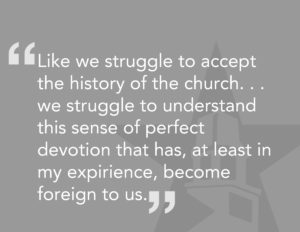Approximately 1,983 years ago, Jesus died on a cross in Jerusalem.
If you’re a glass half-full sort of person, that’s roughly two thousand years. Two thousand years in which the church has existed, adapted, changed, made mistakes and reformed. Two thousand years of history, some of it beautiful, some of it shameful. Christians today carry this legacy with them. It is impossible to join the faith without possessing a connection to people throughout the centuries who have shared it and that connection is, at times, a hard weight to bear. None of us want to claim the crusades, the bombing of abortion clinics or the believers that cited and used biblical support to prop up slavery.
 In the face of this weight, there is a temptation to dismiss the entirety of church history, or significant portions of it. Specifically Christendom, the period between the conversion of the Emperor Constantine (the first Christian ruler in Europe) and the Protestant Reformation, is ignored. While this mindset in understandable – Christendom introduced a marriage of power and faith that is hard to reconcile with a biblical Jesus – it is also problematic. To dismiss Christendom is to also dismiss important practices which could greatly help the modern church. Among these are the reverent writings of many mystics and thinkers of the medieval ages which display a regard and piety for God that is both beautiful and challenging.
In the face of this weight, there is a temptation to dismiss the entirety of church history, or significant portions of it. Specifically Christendom, the period between the conversion of the Emperor Constantine (the first Christian ruler in Europe) and the Protestant Reformation, is ignored. While this mindset in understandable – Christendom introduced a marriage of power and faith that is hard to reconcile with a biblical Jesus – it is also problematic. To dismiss Christendom is to also dismiss important practices which could greatly help the modern church. Among these are the reverent writings of many mystics and thinkers of the medieval ages which display a regard and piety for God that is both beautiful and challenging.
“Oh, abyss of love!” wrote medieval mystic Catherine of Siena. “What heart can help breaking when it sees such dignity as you [God] descend to such lowliness as our humanity?” The words come from Siena’s work Dialogue, a book of her thoughts and prayers which fully focuses on God’s love and the unworthiness of the soul to receive that love. Her imagery throughout is startling. The love of God is like a deep rooted tree which cannot be unplanted; it is also like a mirror the soul can hold up to spot imperfections. After looking, the soul then puts down the mirror, and endeavors to resemble the reflection it saw within. When ready, it once again lifts the mirror and stares at itself anew. To read the Dialogue is to be overwhelmed with the vastness of God – the abyss of love that one cannot help but fall head-first into.
 In a similar way, the writings of Brother Lawrence, a monk in the seventeenth century are full of the same sense of perfect piety. “Adoring God in truth” he wrote “means that our hearts actually see God as infinitely perfect and worthy of our praise. What man…would not exert all his strength to show his respect and love of this great God?” To Lawrence, devotion was an internal communion with God, a whole attitude, a daily leap into submission without reservation. His advice is simple: love Christ completely, nothing more is needed, nothing less should be given. His own practice of this concept lead to a life full of total peace and joy which is documented in the book The Practice of the Presence of God.” Like Siena, Lawrence held an unshakable awe of God’s grace and his own unworthiness to receive it.
In a similar way, the writings of Brother Lawrence, a monk in the seventeenth century are full of the same sense of perfect piety. “Adoring God in truth” he wrote “means that our hearts actually see God as infinitely perfect and worthy of our praise. What man…would not exert all his strength to show his respect and love of this great God?” To Lawrence, devotion was an internal communion with God, a whole attitude, a daily leap into submission without reservation. His advice is simple: love Christ completely, nothing more is needed, nothing less should be given. His own practice of this concept lead to a life full of total peace and joy which is documented in the book The Practice of the Presence of God.” Like Siena, Lawrence held an unshakable awe of God’s grace and his own unworthiness to receive it.
Why have we cut these readings out of our lives? Why are they often absent from our devotions and prayers? Surely if the church placed a higher emphasis on these writings, it would be easier to avoid the temptation to lop Christendom out of history. Although it’s not an easy thought, I wonder if there isn’t some similarity between why the church disregards the writings of Brother Lawrence and the 100 Year War: both are alien in our modern context. Like we struggle to accept the history of the church, blemishes and all, we struggle to understand this sense of perfect devotion that has, at least in my experience, become foreign to us. The fullness of their reverence seems impossible. The ease with which they achieve it even more so. There are good reasons for this – our lives are very different from Catherine’s – and yet the difference does not invalidate their wisdom. The piety of these saints can still present a challenge to us, even thousands of years later. We need not accept everything they say. But the mystics are not the crusades; their words are still valuable and their adoration of God admirable even as it is unfamiliar.
Anna is a junior majoring in English and writing.
